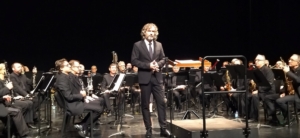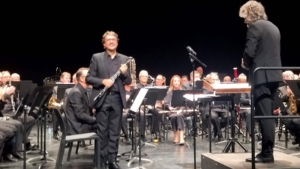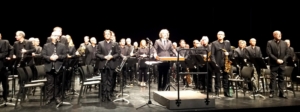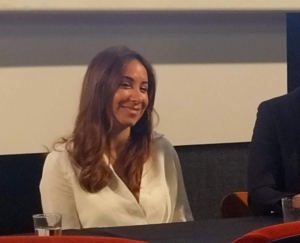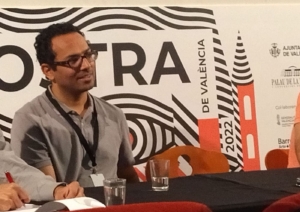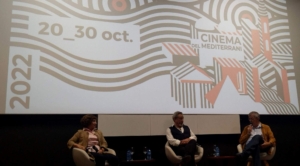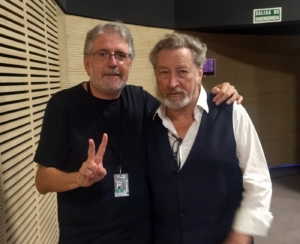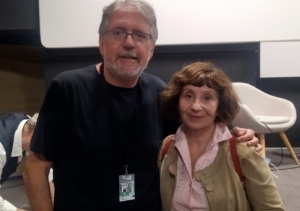Mostra de Valencia-Cinema del Mediterrani 2022 – Special Article
Our colleague Frederic Torres was present at the 37th edition of the Mostra de València-Cinema del Mediterrani, held from October 20 to 30 in Valencia (Spain) (read more), and leaves us here an extensive special article exclusively for SoundTrackFest.
Concert Symphonic Band of Valencia. Mostra de València-Cinema del Mediterrani. La Rambleta. October 23rd, 2022
As has become customary since La Mostra de València – Cinema del Mediterrani resumed its path after being wiped off the map as an austerity measure adopted by a previous corporation, when the consistory was governed by the late Rita Barberá, the Symphonic Band of Valencia offered on Sunday, October 23, the corresponding concert of film music, but not before delivering to the public free of charge, the subsequent compact disc belonging to the recording made the previous year with a program dedicated exclusively to the director Luis García Berlanga, in his commemorative year, whose review was already published on this website (read more).
On this occasion, the concert once again featured Mediterranean composers, including great names in film music, such as the Italians Ennio Morricone and Nino Rota, and the Greeks Mikis Theodorakis and Vangelis, in addition to local representation, like Luis Ivars, with a suite arranged for symphonic band by Frank de Vuyst from El Capitán Trueno y el Santo Grial (2011), which was precisely the first to open the program, by the guest conductor, Ángel López Carreño from Granada.
He gave a didactic tone to the concert by contextualizing, with varying degrees of success, each of the works to be performed, so that when it was the turn to play the famous Theodorakis’ dance performed by Anthony Quinn in the well-known Zorba, the Greek (1964), he mentioned that the peculiar dance of the Hollywood star of Greek origin was due to a knee injury, which caused the actor to perform the famous dance in a completely free way, in collusion with the film’s editor.
Then it was the turn of Morricone’s The Hateful Eight (2015), a work for which, as López Carreño explained, the Roman composer won his Oscar in competition, after having won an honorary one for his career as a whole a few years earlier. The director recalled how courteous and affectionate John Williams himself was when the historic Morricone finally won the precious statuette. The interpretation, a crescendo of tension that the band played with millimetric precision, was widely applauded, and with that came the turn of the great protagonist of the night, who was none other than Vangelis. To this effect, a suite created ex-profeso for the occasion was presented, entitled “Vangelis Fantasy”, with arrangements by Azael Tormo, which, according to López Carreño, had the common characteristic of not including any original theme composed for cinema or television, although they were later used in one or the other medium.
This was certainly the case with “Pulstar”, from the album Albedo 0.39, which was later used in Cosmos (1980), Carl Sagan’s mythical series; but not with “Missing”, the main theme of the well-known Costa-Gavras film about the disappeared in the Argentine dictatorship, starring Jack Lemmon in 1982, which was an original composition made for the film in question; nor with “Anthem” (“Hymne”, in the original), belonging to the television series, L’Opéra Sauvage (1976), by the documentary filmmaker Frédéric Rossif, who had already counted on the Greek composer for two of his previous well-known works such as L’Apocalypse des animaux (1973), and La Fête Sauvage (1976).
In any case, it was one of the best of the program, for its novelty and originality, since these are not pieces that are usually heard in a public way, much less in an orchestral transcription. In this sense, of less interest were the central themes of Chariots of Fire, which won its composer an Oscar in 1981 (against such powerful rivals as Williams’ Raiders of the Lost Ark, as López Carreño rightly recalled), and that of 1492. The Conquest of Paradise, a film made by Ridley Scott in 1992 to commemorate the Fifth Centenary of the discovery of America, starring Gerard Depardieu, much more interpreted and known to the general public, and therefore, more celebrated.
Finally, the Symphonic Band undertook another suite, this time with the great Nino Rota as the protagonist and with the celebration of the 50th anniversary of the premiere of The Godfather (1972) as the main reference, in which, after starting the work with the well-known trumpet solo of that score, themes belonging to War and Peace, King Vidor’s 1954 version, Rocco and His Brothers, a film released by Visconti in 1960, some waltzes from El Gatopardo, also by Visconti, a masterpiece of Italian cinema from 1963 that the director mistakenly translated as The Leopard for its Spanish premiere, were performed. This was followed by a further development of The Godfather and its well-known love theme, to return to another mythical title such as La Dolce Vita (1959), the Fellini film that caused major scandals in the early sixties, and then discover some theme of the unknown El Sol se Pone, el Sol se Levanta, a 1973 film by the Japanese Koreyoshi Kurahara, before finishing off with the mythical love theme from Zeffirelli’s 1968 film Romeo and Juliet, and Fellini’s classic La Strada, the 1954 film starring Anthony Quinn and Giulietta Masina in her unforgettable role as Gelsomina.
La Mostra de València: Musical synthesis
Regarding La Mostra, the award for best soundtrack went to Amin Bouhafa for Entre las Higueras, the excellent film by director Erige Sehiri, Tunisia’s nominee for the Hollywood Oscar for best foreign film, very similar in theme to the Catalan film Alcarràs, in which the composer uses music that counterpoints. The best example of this is the ending, in which the incidental music, a metaphor for the story, is gradually superimposed on the traditional songs of the women returning home in the pick-up truck at the end of the day.
Also pleasantly surprising was the inclusion of a version, in an Arabic dialect, of the emblematic and mythical song by Lluis Llach, L’Estaca, much chanted and celebrated in the last days of Franco’s dictatorship by the citizens, as a metaphor for the fall of the regime, something that the attentive and intelligent director, Sehiri, justified as a reminder of the recent Arab Spring revolution that took place in her country, Tunisia. However, the winner of the Palmera de Oro was the French-Iranian film Until Tomorrow, by Ali Asgari, which won three major awards, including Best Director and Best Actress (Sadaf Asgari), but which does not have any music, a question about which I asked its director, who replied that including music might have been counterproductive, since it could take the viewer out of the film, and that this is more common in Hollywood cinema than in films with a realistic vocation like his. This, despite reminding him that the founder of neorealism, Roberto Rossellini, always used original music by his brother, Renzo, in his most renowned works (Rome, Open City; Germany, Year Zero, etc.), or mentioning the aforementioned example of Entre las Higueras, whose score elevates the artistic category of the film. Asgari, however, shows a greater inclination to follow the guidelines of Iranian masters such as Kiarostami and Panahi, from whom he takes some tracking shots (the final shot-sequence is brave and worthy of the former’s best work), and the everyday, but highly tense plot that sustains the story’s argument (which could have formed the structure of any Panahi film).
One of the biggest attractions of this year’s Mostra was the tribute paid to French filmmaker Robert Guédiguian (and therefore to his partner, who accompanied him at all times, actress Ariane Ascaride), whose extensive retrospective was screened and who gave a masterclass at La Filmoteca, with its capacity filled to the last seat. Asked by yours truly about the use of classical music in his films, and about his sporadic pairing with the now renowned composer Alexandre Desplat, the director recalled that it was precisely with him that the composer debuted in 1985 with Ki Lo Sa?, but that unlike him, Desplat already had two Oscars, something he joked about, considering that this will probably be an award he will never receive.
He explained that he had not established a pairing with him for the music, in the style of Ken Loach and George Fenton, to give a close example due to the social characteristics of the films of both directors. Guédiguian emphasized that since his debut with the magnificent Last Summer (Dernier Été), in 1981, in which he already used Vivaldi as a counterpoint to the degraded images of the industrial working-class landscape of the neighborhood of L’Estaque, where the action takes place in most of his entire filmography, which now totals some twenty-four feature films, that the working class also had the right to enjoy the so-called “classical music”, and that for that reason he included composers like Mozart or Johann Strauss and his Blue Danube, in the same sense that Kubrick did in his famous space ballet for 2001, only with the images of the Marseilles working class neighborhood mentioned above (specifically, at the beginning of À la Vie, À la Mort! , -1995-).
In short, his masterclass was as revealing as it was interesting. And La Mostra managed, with his presence and that of Ascaride (attentive, polite and very friendly), to add to the high level of the Official Selection, the Informative Section, as well as the important retrospectives such as those dedicated to 20th century Greek cinema, and the French director, of Bosnian origin, Lucile Hadzihalilovic, also present at the festival, who arrived in time to present the impressive Innocence, which she made in 2004, as well as her latest film, Earwig, released last year, 2021.
In any case, in the festival’s “must” was to take advantage of the presence of the Greek composer Evanthia Reboutsika as President of the Jury, in order to offer some kind of concert or recital, as was done last year with the French composer and pianist Jean-Michel Bernard, who was a member of the Jury, who gave a masterclass, in addition to offering a concert of film music in El Almudín (read more). The expectations raised by these events, splendidly received by the public, who attended both of them massively, have so far proved to be a one-day flower, so that the possible recovery of the long-missed València Film Music Congress, linked to La Mostra for more than a decade (the nineties), still seems far away from being able to become an event of this kind, despite the confirmed increase in the festival’s budget, announced by the councilor of the municipal council, Gloria Tello, at a time when such events are proliferating throughout the peninsula and Europe. Although there is still none specifically focused on the Mediterranean. An occasion that should be explored before it is too late.
Article and pictures by Frederic Torres


